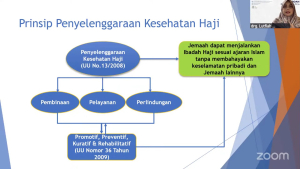Realizing a Safe and Healthy Hajj: Collaborating for Better Services
Yogyakarta, May 14, 2025 – Raboan Research and Perspective Sharing session held on Wednesday, May 14, 2025, with an engaging topic, “Health and Safety in Hajj: Strategies and Implementation.” The event featured drg. Lutfiah Sahabuddin, M.K.M., from the Faculty of Medicine, Universitas Alkhairaat, Palu, as the main speaker.
In her presentation, drg. Lutfiah emphasized the importance of health and safety strategies for Hajj pilgrims. According to the data presented, illnesses such as septic shock, cardiogenic shock, and acute myocardial infarction have been the leading causes of death among Hajj pilgrims in recent years.

Presentation session by drg. Lutfiah as speaker

discussion session with Raboan participant
“Hajj health management should prioritize promotive and preventive measures. Educating pilgrims from the preparation phase to the actual pilgrimage is key to reducing mortality rates,” stated drg. Lutfiah. She also highlighted the importance of teaching Hajj health to medical students, as has been implemented at the Faculty of Medicine, Universitas Alkhairaat, Palu, through a dedicated Hajj and Umrah module in their curriculum.
Furthermore, drg. Lutfiah discussed the ethical dilemmas often faced by Hajj healthcare professionals. One example is the case of elderly pilgrims who are not medically fit (istitha’ah) to perform Hajj, but their families refuse to accept this decision. To resolve such issues, the involvement of community leaders, healthcare teams, and the Ministry of Religious Affairs is crucial. These stakeholders must coordinate and deliberate to reach the best decision, ensuring that families understand and accept the outcome.
This discussion aligns with the commitment to achieving the Sustainable Development Goals (SDGs), particularly SDG 3 on good health and well-being. It is part of broader efforts to enhance public health literacy and improve the quality of Hajj healthcare services in Indonesia.
Through this discussion, Raboan Research and Perspective Sharing served as a valuable platform for exchanging knowledge and experiences related to the health of hajj pilgrims. It is hoped that this event will encourage improvements in hajj health services and strengthen collaboration among various stakeholders in addressing challenges on the ground. Ultimately, the goal is to ensure that Indonesian pilgrims can perform their pilgrimage in a safer, healthier, and more dignified manner.
[easy_youtube_gallery id=j-hP3fm2TJk cols=1 ar=16_9 thumbnail=0 title=top]Health and Safety in Hajj: Strategies and Implementation[/easy_youtube_gallery]


